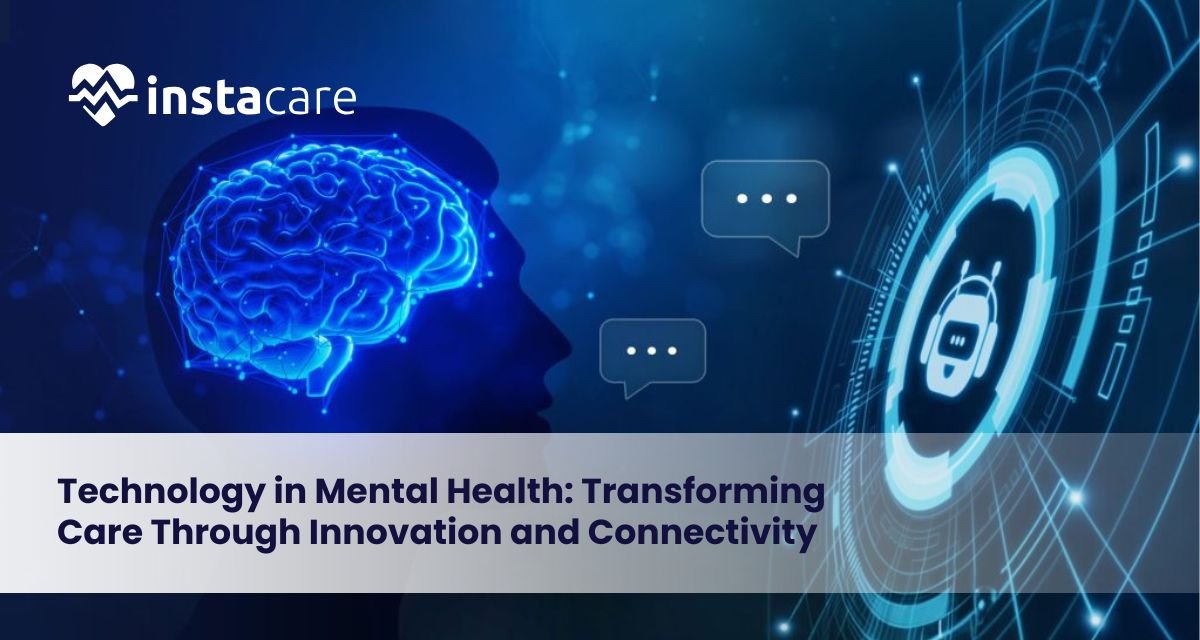Last updated on Friday, 10, October, 2025
Table of Contents
Technology in Mental Health: Transforming Care Through Innovation and Connectivity
Our technology-engulfed era, where technology is a valuable asset in the management of mental illness, has seen rising cases of global stress disorders, Technology as anxiety and depression. Technology is now providing new avenues through which support is becoming more convenient, tailored, and effective. Use of technology in mental health shifted from promotional campaigns today to welcoming advanced gizmos, apps, and sites providing access to therapists, emotion tracking, and instant support.
From artificially intelligent therapy to online mental care services, technological advancement is revolutionizing the way people receive help, the way that practitioners work, and the way that the world views mental illness. Access and the connectivity that the technologies provide are erasing the old barriers and allowing millions of people to receive help from home.
Role of Technology in Mental Health
The role of technology in mental health is in three ways with accessibility, personalization, and prevention. Treatment by media that are digital can be done irrespective of where one is based or their economic status they have. All the technology-based form of access to care allows one to act early and follow up at all times, something one requires in dealing with chronic psychological disorders.
Technology enables individuals to monitor symptoms and engage in behavior with smarter devices, and the patient is able to conduct therapy sessions or self-help exercises without stigma.
Digital Mental Health Platforms and Apps
Among the most significant innovations is the development of apps and websites offering real-time mental health care and self-help information. These mental health applications consist of mood charts, guided meditation, CBT programs, and peer support chat groups.
- These online mental health sites have opened the profession of access therapy by making common occurrences of counseling less expensive financially.
- Examples include well-known apps such as Headspace, Calm, and BetterHelp with millions of subscribers globally.
- They enable individuals to monitor progress, establish goals, and monitor symptoms via direct Digital interventions for mental health. The advantage of technology in mental illness management is found within the device itself with the portability and ease of use.
- People who, for fear of social stigma or domicile, never mustered the courage to visit a therapist are now able to go about obtaining service in private at their own leisure.
Teletherapy and Online Counseling
The COVID-19 pandemic brought teletherapy and online counseling to the forefront faster, and now online sessions are an everyday mode of therapy. With secure video calls and chat interfaces, professional therapists can administer online therapy, uninterrupted, even in the case of lockdown or an emergency.
- It benefits both the patients and therapists. Patients can come without having to drive, and therapists can work with additional clients.
- Teletherapy also encourages honesty and ease because patients feel more at ease in revealing things from places they know.
- The efficacy of internet therapy and teletherapy has been supported in numerous studies of research as well as with single-case therapy for the treatment of anxiety, depression, and trauma.
Artificial Intelligence in Mental Health
Applying Artificial intelligence in mental health to cure mental illness is a leap of faith. AI programs are founded on patterns in verbal behavior, facial expression, and written communications to make assumptions about emotional status and symptoms of potential mental illness.
For example, chatbots like Woebot or Wysa use natural language processing to provide empathetic support to users in coping behavior practice and crisis intervention. Mental health chatbots are available 24/7, with the hope of providing individuals in crisis with access to the continuity of care.
Artificial intelligence also helps physicians forecast patient outcomes, tailor therapy plans, and identify potential high-risk patients who need to be treated with priority. With the passage of time, technology will certainly advance even more to a point where the use of AI will become an enabling Digital mental health tools for therapists and render the diagnosis more precise and therapies more personalized.
Wearable Technology and Mental Well-being
Another potential is Wearable technology for mental health, such as biosensors and smartwatches, monitoring heart rate, sleep, and stress levels. These allow patients and professionals to monitor emotional and physiological reactions on a daily basis.
In addition to Remote mental health monitoring, wearables enable prevention and early intervention, and enable one to actively care for emotional well-being instead of responding.
Virtual Reality (VR) and Augmented Reality (AR) Therapies
Virtual reality in mental health treatment is revolutionizing exposure therapy, mindfulness training, and relaxation procedures. VR envelops patients within a virtual world to expose them to their fears in a safe environment, to teach them how to manage them, or to take them through meditation.
For example, PTSD patients are exposed to traumatic experiences in controlled virtual reality because the therapists can lead them through re-learning and reinterpretation of their response. Likewise, social anxiety patients are able to rehearse social competence in a simulation environment so that they build confidence before exposure.
Big Data and Mental Health Research
Big data psychology is revolutionizing the manner in which researchers perceive patterns of emotional well-being. By analyzing data gathered with online treatment for psychopathology, wearable sensor-based sensors, and online social media interaction, researchers have been able to examine scales of large behavior patterns.
This data can be used to recognize early warnings for mental health crises, monitor the population, and optimize treatment. Big data findings have the potential to transform public health policy but also bear chilling Data privacy in digital mental health concerns over electronic mental health.
The Future of Technology in Mental Health
The Future of technology in mental healthcare is bright with innovation to customize it and make it affordable. Application of AI, VR, and wearables in daily life can potentially diagnose and cure mental illness years in the future, when the disease is still in its infancy.
- Predictive analysis can be carried out by therapists and applied according to pre-intervention on the basis of behavioral data.
- Intervention can be implemented within online forums, where individuals of a shared background are provided with an opportunity to gather together and provide peer healing and support.
Technology will have to assist but never to substitute, for humans to touch the foundation of mending one’s mind. Automation and compassion will align where the next wave of mental health care converges.
Technology and Emotional Wellbeing
They are emotionally and technologically reliant. Technology, optimally utilized, might create for a deeper comprehension of oneself, de-medicalization of mental illness, and openness for mental illness to be an option. Cyber-bulletin boards, software, and online counseling could facilitate an acceptance and legitimation of a lonely or ignorant person of his/herself.
Conclusion
The technology revolution transformed the way to mental health into one of more accessible, effective, and targeted treatment. Mental health AI, virtual reality mental health therapy, and new additions go on. Not only can technology make old-school therapy convenient and easy, but also make people their own experts in wellness with real-time feedback and suggestions.
FAQs
Q1: How can digital tools improve mental health?
Mental health apps provide treatment, self-help activities, and mood monitoring, enabling one to treat anxiety and depression anywhere and at any time.
Q2: Are mental health applications as effective as face-to-face therapy?
Technology-based mental health apps are not substitutes for therapists but can be employed in early treatment, symptom monitoring, and follow-up between sessions.
Q3: What are the limitations of technology in mental health?
Its three biggest challenges are to provide privacy for online mental well-being, fighting misinformation, and sustaining human empathy for tech-facilitated mental health.



